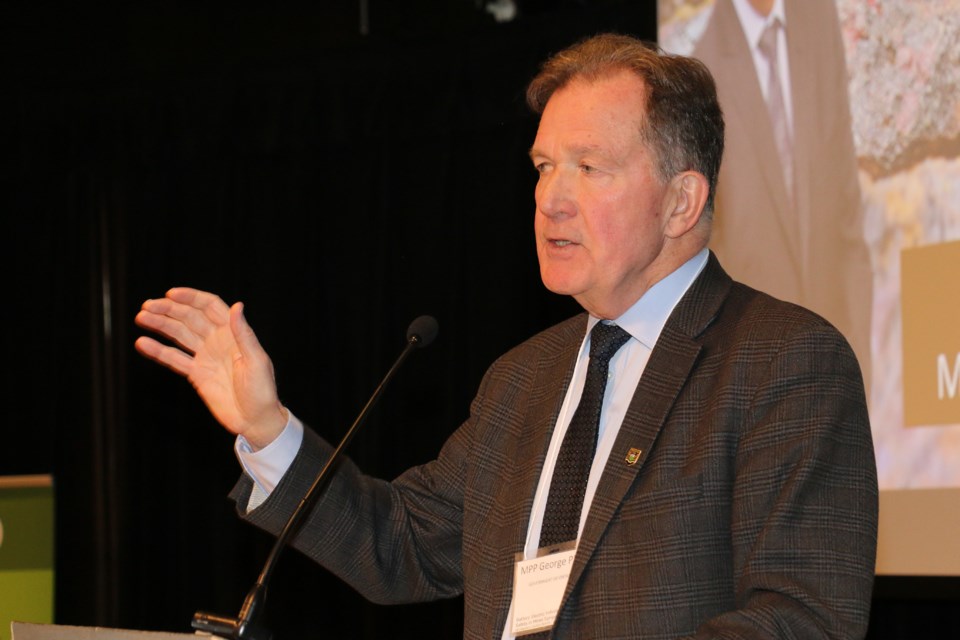When it comes to critical minerals for the battery electric vehicle industry, Ontario Mines Minister George Pirie is telling people to stay away from Chinese-financed nickel, to stay away from cobalt from the Congo and to buy Canadian products.
Pirie said he is taking that same message to Washington, D.C. when he visits the U.S. in April.
He was in Sudbury last week at the Workplace Safety North forum on the safety of battery electric vehicles in mining. Pirie spoke at Cambrian College on the importance of the supply chain of Canadian minerals for the manufacture of batteries.
"And we can secure the supply chain here in Ontario. Now we don't want the nickel from Indonesia. That nickel is powered by coal, by burning coal and the money comes from China. Why would you take nickel from Indonesia and build a battery in North America and say it's a green solution or that you're helping the climate? You're not," said Pirie.
"And we don't want the cobalt from The Congo. We all know that. And we have what the world wants here now in Northern Ontario. And in fact, it's not just our opportunity, it's our obligation. It's our responsibility to get this done," he added.
Pirie said Ontario is serious about becoming the leader for producing critical minerals, the program that was announced by the province two years ago.
He said the program is working out on two fronts, through the Ontario Innovation Fund and the Ontario Junior Exploration Program.
"The junior exploration program is at about $35 million right now. We've had a lot of success with that program. And in fact, we know it's working because Ontario right now has the highest or largest expiration spend in Canada," Pirie said.
He said the payoff is being seen by the discovery and development of numerous new deposits for such minerals as lithium, nickel, cobalt and graphite.
Pirie specifically mentioned the Frontier Lithium deposit in northwestern Ontario, owned by a company which has set up its head office in Val Caron.
"And that's what we want. We want the head offices to stay here. We want the value-added industries to stay here, because this is where it should be. We have the ability to sequester the carbon. We have the opportunity to be the masters of our destiny right here in Northern Ontario. And this is the first time that this has happened," said Pirie.
He said that critical minerals are indeed critical to the future of Northern Ontario.
"Yes, they are. We have to find them. We have to develop them, process them. We have to build the value-added industries here in Northern Ontario."
Pirie also spoke about the importance of rare-earth minerals, which also need to be developed. He said rare earths have been found in northeastern Ontario, west of Otter Rapids, but the deposits are not yet developed. Pirie said these minerals are vital to producing magnets for the electric motors in battery vehicles.
"The majority of the rare earths, of course, are in China, and we have to secure that supply chain. If China embargoed those rare earths, we would be out of business. We wouldn't be able to produce those electric vehicles. It's critical. The Chinese have been way ahead of us on a lot of things, but especially with the conversion to electric vehicles," he said.
Pirie added that while China is trying to create the dominant economy, it is still important for Northern Ontario to support the home-grown mineral wealth that exists here.
Pirie also mentioned MacLean Engineering, which produces battery electric mobile mining equipment in Ontario for export to the global market. He said if a vital industry doesn't get support at home, it will be lost.
Pirie said he will be making an official visit to Washington, D.C. in April to talk about the importance of supporting the North American battery electric vehicle industry.
"Why would you buy a vehicle that uses a battery where coal was used to produce a nickel? It does not make any sense. Or cobalt from The Congo?" Pirie asked.
"We've got to be strong on that message."
— Sudbury.com




